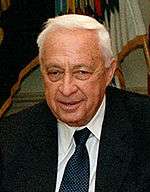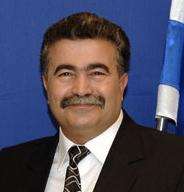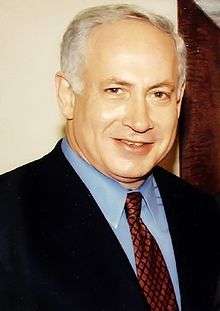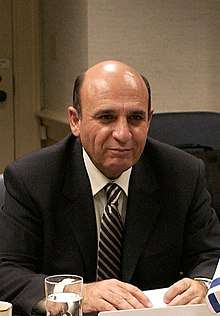Leader of the Opposition (Israel)
| Leader of the Opposition
יוֹשֵׁב רֹאשׁ הַאוֹפּוֹזִיצְיָה Yoshev Rosh Ha-Opozitzya | |
|---|---|
| Term length | While leader of the largest political party not in government |
 |
|---|
| This article is part of a series on the politics and government of Israel |
The Leader of the Opposition (Hebrew: יוֹשֵׁב רֹאשׁ הַאוֹפּוֹזִיצְיָה, Yoshev Rosh Ha-Opozitzya) is the politician who leads the Official Opposition in the Israeli legislative body, the Knesset.
Until 2000
Until 2000, the role of the Opposition Leader was not an official position, but rather an honorary role. The Leader of the Opposition used to be the leader of the largest party not within the government, which was also the second largest party in the Israeli parliament, the Knesset, either Likud Party or Israeli Labor Party, in all their versions. However, the party leading the coalition had never won the majority in the Knesset, but rather maintained it through a majority coalition building process within the Knesset. Over half a century (except for two occasions), either the Likud party or the Labor party, in all their versions, had formed the government (i.e. the Cabinet), without the other rival party joining the government, and thus except for these two occasions, wherein 1967–1970, Golda Meir and Levi Eshkol, and in 1984–1990, Shimon Peres and Yitzhak Shamir had formed a National Unity Government, consisting of the two major rival parties, the Opposition Leader had always been the chairman of either the Likud party or the chairman of Labor, and it is commonly said that during that period, wherein the two major rivals parties were joined by a unity government, there were practically no opposition in the Knesset.
Since year 2000
Even with the absence of a law defining the role of the Opposition Leader until 2000, it was customary to conduct update meetings between the Prime Minister and the chairman of the largest party not within the government. However, it was carried out only according to the Prime Minister's decision, and thus the Knesset had to pass legislation to anchor the position of the Opposition Leader, in order to strengthen the Opposition's status as an oversight apparatus to the operations of the installed government's activities.
Knesset Law, chapter 6
In early 2000, two bills to amend the Opposition Leader's status were submitted to the Knesset. One was a "Government bill"[1] (bill initiated by the government), and the other was a "private members' bill"[1] (initiated by a single or a group of Knesset Members), submitted by MK Uzi Landau. The bills were merged into one amendment, and on 17 July 2000, the Knesset had approved Amendment 8 to the "Knesset Law" of 1994,[2] wherein chapter 6 within this law was added, outlining the role of the Leader of the Opposition.
The law stipulates the selection of the Opposition Leader, his replacement, regulates his ceremonial role in various official events, and obliges the prime minister to update him on current state affairs once a month. The law also stipulates that the Opposition Leader's salary will be determined by Knesset committee, and shall not be lower than a salary of a Cabinet minister.
Problematics
As long as the role of the Leader of the Opposition was an honorary role, the Knesset members of the opposition didn't care much who will be the Leader of the Opposition, but when the proposal to regulate the role came up, questions began to rise: 'Who is the opposition leader?', since the opposition is made up from various parties; the only thing they have in common is the fact that none of them is a member of the governing coalition and the cabinet; and the Opposition Leader is a person whose party may have won by only one vote more than the other opposition parties. Therefore, a situation may arise where the opposition members are for example, rightist National Union on one hand, and the Arab parties, on the other hand. The question was whether there can be an opposition leader that will be able to assemble all factions of the opposition, and to properly represent each and everyone's interest within the opposition.
In one example, where these concerns where actually practiced, was in 2005, when the secularist party of Shinui was forced to leave the governing coalition, and the chairman of that party, then MK Tommy Lapid was selected to head the opposition in the Knesset, while the religious-orthodox parties, United Torah Judaism and Shas, refused to recognize his authority and claimed he did not represent them.
List of Opposition leaders
- 1948–1967: Menachem Begin
- 1967–1970: There wasn't any clear Opposition Leader during this period, though the head of the largest faction within the Opposition, between 1967–1969, was Meir Ya'ari (Mapam party, 8 seats). Between 1969–1970, Yitzhak-Meir Levin (Agudat Israel party, 4 seats) was the leader of the largest Opposition faction.
- 1970–1977: Menachem Begin
- 1977–1984: Shimon Peres
- 1984–1990: There wasn't any clear Opposition Leader during this period, though the head of the largest faction within the Opposition, between 1984–1988, was Yuval Ne'eman (Tehiya-Tzomet party, 5 seats). Between 1988–1990, Shulamit Aloni (Ratz party, 5 seats), was the leader of the largest Opposition faction.
- 1990–1992: Shimon Peres
- 1992–1993: Yitzhak Shamir
- 1993–1996: Benjamin Netanyahu
- 1996–1997: Shimon Peres
- 1997–1999: Ehud Barak
- 1999–2000: Ariel Sharon
Post–2000
After Amendment 8. to the "Knesset law" of 1994 was passed, the Leader of the Opposition became the person which the largest faction of the Opposition selected:
| Colour key | |||||||||
|---|---|---|---|---|---|---|---|---|---|
| Labor | Likud | Kadima | Meretz | Shinui | |||||
| No. | Name (Birth–Death) |
Portrait | Political Party | Term |
|---|---|---|---|---|
| 1 | Ariel Sharon אריאל שרון (1928–2014) |  | Likud | 30 July 2000 – 7 March 2001 |
| 2 | Yossi Sarid יוסי שריד (1940–2015) | Meretz | 7 March 2001 – 4 November 2002 | |
| 3 | Binyamin Ben-Eliezer בנימין בן אליעזר (1936–2016) |  | Labor | 4 November 2002 – 28 February 2003 |
| 4 | Amram Mitzna עמרם מצנע (1945–) |  | Labor | 28 February 2003 – 13 May 2003 |
| 5 | Dalia Itzik דליה איציק (1952–) Faction leader |  | Labor | 13 May 2003 – 25 June 2003 |
| 6 | Shimon Peres שמעון פרס (1923–2016) |  | Labor | 25 June 2003 – 10 January 2005 |
| 7 | Yosef Lapid יוסף לפיד (1931–2008) | Shinui | 10 January 2005 – 23 November 2005 | |
| 8 | Amir Peretz עמיר פרץ (1952–) |  | Labor | 23 November 2005 – 16 January 2006 |
| 9 | Benjamin Netanyahu בנימין נתניהו (1949–) |  | Likud | 16 January 2006 – 6 April 2009 |
| 10 | Tzipi Livni ציפי לבני (1958–) | .jpg) | Kadima | 6 April 2009 – 2 April 2012 |
| 11 | Shaul Mofaz שאול מופז (1948–) |  | Kadima | 2 April 2012 – 9 May 2012 |
| 12 | Shelly Yachimovich שלי יחימוביץ׳ (1960–) | Labor | 9 May 2012 – 23 July 2012 | |
| (11) | Shaul Mofaz שאול מופז (1948–) |  | Kadima | 23 July 2012 – 5 February 2013 |
| (12) | Shelly Yachimovich שלי יחימוביץ׳ (1960–) | Labor | 5 February 2013 – 25 November 2013 | |
| 13 | Isaac Herzog יצחק הרצוג (1960–) | Labor, Zionist Union | 25 November 2013 – 31 July 2018 | |
| (10) | Tzipi Livni ציפי לבני (1958–) | .jpg) | Zionist Union | 1 August 2018 – Incumbent |
References
- 1 2 מילון עברי-אנגלי למונחים הקשורים לעבודת הכנסת ולמשכן הכנסת
- ↑ Not the "Basic law: the Knesset"
External links
- Chapter 6: Leader of the Opposition, The Knesset law of 1994 Wikisource (in Hebrew)